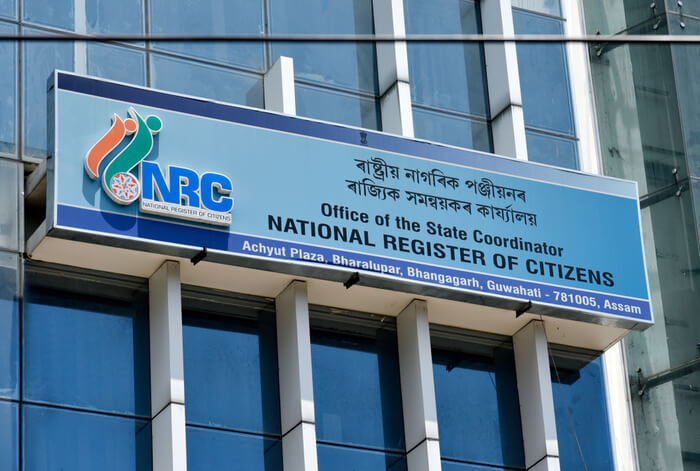NRC: All you need to know
Contents
The Government authorities who had been given the laborious task of updations of National Register of Citizens (NRC) in Assam have finished the exercise. With it’s completion, other states such as Karnataka and West Bengal have raised demands for a similar exercise. The Union Home Minister cranked it up by stating that nation wide NRC updation is a desideratum.
This article aims to throw light on NRC, it’s implications and subsequently discuss the viability of nation wide NRC.
NRC and Assam

NRC is a list of all legal citizens in a territory and currently, Assam is the only Indian state which has such a document. It was first prepared in the year 1951. It’s aim is to identify Indian citizens in the state thereby ruling out all the illegal immigrants. But why only Assam?
It’s because of it’s strategic location and the Geo-politics associated with it. Before the India-Pakistan war of 1971, Bangladesh was a Pakistani territory known as East-Pakistan. Due to linguistic uprisings in East- Pakistan, the Pakistan government came down on the agitators aggressively. This ethnic violence was followed by full-fledged war between India and Pakistan. All these factors led to large scale migrations from erstwhile East-Pakistan to India.
This massive migration of people into India instigated the local population with concerns of more burden on resources, lesser jobs for locals, losing of cultural identity etc. The movement led by All Assam Student Union(AASU) was the most vibrant and successful. Their demand of identifying illegal immigrants was accepted in 1985 and a promise was made to update the 1951 citizen register. With this, the Citizenship Act of 1955 was amended and any person entering India from Bangladesh after the mid-night of March 24, 1971 was declared illegal. Though promised, the updation of NRC was not carried out until recently.
In the last few months, the people in Assam queued infront of the authorities with their documents to prove that their fathers, grandfathers etc entered India before the 1971 deadline. The final list of NRC has named about 19 lakh people out of 3 crore population of Assam as illegal immigrants. The future state for these excluded is yet to be decided.
What next for these 1.9 Million illegal immigrants?
The Prime Minister and the External Affairs Minister have stated multiple times that the ongoing NRC exercise is an internal matter of India. This rules out the option of deporting them back to Bangladesh. The widely speculated move is that detention camps will be made to house these immigrants but no such words have been spoken out from the government side. But the most controversial debate regarding the Citizenship Amendment Bill which will be reintroduced in the parliament shortly throws some light on the issue.
According to the proposed amendment to the Citizenship Act: Hindus, Parsis, Christians, Jains, Buddhists and Sikhs who migrated from Pakistan, Afghanistan and Bangladesh before December 31, 2014 will not be named as illegal. If the above stated bill is passed, 1.5 million people out of 1.9 million people will be considered as legal citizens. The debate is that such an amendment which is based on religious identity violates the basic structure of the Constitution which is whole-together a separate issue.
Rising demands by other states
Other states are demanding similar exercise as they too have experienced influx of illegal immigrants due to various factors. Their demands have to yet be approved by the Union Home Ministry.
Why a Nationwide NRC exercise is not desirable?
If the statements made by Home Minister come into existence, all the citizens of the nation (regardless of legal or illegal) have to line up infront of authorities to prove their identity. This will lead to losing out of man hours in productive activities which would exacerbate the economic slowdown. Added to this, the cost incurred in such an exercise is exorbitant. Around 1200 crore rupees was spent to conduct NRC in Assam which has a mere 3 crores population
Apart from all this, the most unviable part of such an exercise is the involvement of humans. The probability of mistakes increase exponentially with the people’s involvement. Many such wrongful inclusions and exclusions were reported in the Assam exercise. With the uncertain decisions over the identified illegal immigrants, the exercise whole together lacks a credible backing.
Way forward
Specific policy ascertaining the fate of “stateless” people should be formulated with bilateral agreements as well as assistance from UN High Commission for Refugees. The upcoming Census in 2021 must be incorporated with the necessary features so that a nation wide NRC must be avoided. Amidst all its apprehensions, NRC is a forward looking step in documenting India’s citizens deter infiltrators. The NRC process, at the current juncture is an outcome of both judicial path and political balance of power as Supreme court has driven it, closely monitoring the entire process.
Article by Shabaz Khan
For more such posts, click here



0 Comments